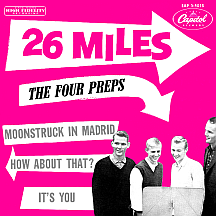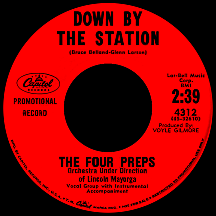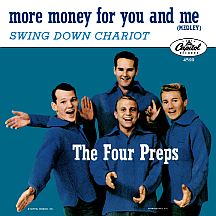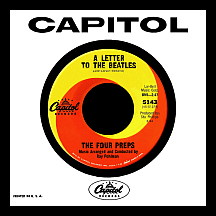THE FOUR PREPS
The Four Aces...Four Freshmen...Four Lads...Crew-Cuts! These popular white male vocal groups of the early 1950s found themselves competing mid-decade with rookie upstarts The Four Preps. Formed while in high school in 1954, they looked and sounded younger, acted somewhat immature...and that was okay, as soon there would be an excess of "teen idols" (sparked by the explosive debut of Elvis) who were younger still, cutting in on their action as they had done with those "old" twentysomething quartets. David Nelson (who played himself on ABC-TV's The Adventures of Ozzie and Harriet) was a fellow Hollywood High classmate with a kid brother named Ricky, whose destiny was to join the "Big E" in the top echelon...after a year or two, once he turned 16 and decided rock and roll was the happening thing. The Preps were right there in the thick of the late-'50s hitmaking movement wherein youngsters wrested a majority of singles sales from their parents' positively ancient favorites (some over 30, even closer to 40!), many of whom lived to sing another day as albums and that cool new dual-speaker stereo thing took hold.
Lead singer Bruce Belland headed a quartet of pals who were still teenagers when their first single reached the charts. Baritone Glen Larson, bass Ed Cobb and high tenor Marvin Ingram (birth name: Inabnett) made their public debut in 1956 at a Hollywood High talent show. A tape of the performance came to the attention of Capitol Records producer Voyle Gilmore, who signed them to a contract (despite the presence of the similarly-configured-but-jazzier Four Freshmen, a mainstay of the label since '51) and produced most of their recordings for the better part of a decade.
By the end of the year, the Preps were on the charts with their first single, "Dreamy Eyes," a soft, retro-style ballad (also recorded by L.A. group The Youngsters) by film composer Jack Hoffman and one-time collaborator Bebe Blake. This mildly popular debut was followed by "Moonstruck in Madrid" (written by Leon Pober, whose career peak with "Tiny Bubbles" was still nearly a decade away) and "Falling Star" (by married song-scribblers Bill and Doree Post, whose career peak with "Sixteen Reasons" came after three more years of pounding the pavement). While the vocals were spot-on, these early efforts lacked something...tempo, perhaps? Mid-'57 release "Again 'n' Again 'n' Again" (penned by Joni James' brother-in-law Nick Acquaviva and lyricist Ted Varnick) remedied this concept with a near-frantic pace. But the year passed without a major hit, or even another minor one. Maybe they needed to spice things up with an original composition...or two?
Cast as David's "singing fraternity brothers" on several 1957 episodes of Ozzie and Harriet, they performed "Oh, You Beautiful Doll," backed David on the creaky "I Want a Girl (Just Like the Girl That Married Dear Old Dad)" and joined Ricky for one of his early hits, "Have I Told You Lately That I Love You?," then toured with him that summer as his opening act. In October, they landed a spot on CBS-TV's star-studded, Emmy-nominated variety special The Edsel Show alongside Bing Crosby, Frank Sinatra, Rosemary Clooney, Louis Armstrong and Bob Hope. Their name may have typecast them; "Boola Boola" (Yale's notorious football song) was their main contribution to the show.
Larson and Belland had been writing songs together and one about an '...island of romance' became the breakthrough tune. "26 Miles (Santa Catalina)," with country guitarist Joe "King of the Strings" Maphis supplying the breezy arrangement, was one of those imagination-sparking songs and spent several weeks in the top ten from February to April. Another Belland-Larson song, "Big Man," illustrating the pitfalls of being overly-confident in the romance department ('I said I didn't need you then...but boy you oughta see me now!'), raced to the top ten in May and stayed until July. Capitol staffer Lincoln Mayorga did the arrangement for this and "Lazy Summer Night" (penned by Harold Spina for Andy Hardy Comes Home starring Mickey Rooney), a September top 30 charter that added to their position as one of 1958's most popular groups. Marv Ingram was attending UCLA and didn't give it up despite the Preps' success. In fact, he took a leave of absence from the hitmaking act to finish his studies. Don Clarke, a local singer who fit the profile, took his place for about a year, just in time to be part of the Four Preps' big screen debut.
In the spring of 1959, they portrayed a beach band in Gidget (Sandra Dee's career-defining starring role), performing "Cinderella," which had already been on the Hot 100 in late '58, in addition to the film's title theme (a cover by co-star Jimmy "Moondoggie" Darren was a hit). With many TV guest shots including American Bandstand, The Ed Sullivan Show and Tennessee Ernie Ford's prime time series, the best they could muster in 1959 were near-misses: Bruce and Glen's "Big Surprise" (a happy sequel to "Big Man"?) and a toe-dip into C&W with a cover of the Webb Pierce smash "I Ain't Never." Then Marvin returned and some new surprises were in store as the '60s got under way.
They began performing on college campuses to students in their age group, finding great success (like other pop groups and especially folk acts of the era). "Down by the Station" ('...early in the morning'), a children's singalong set to the tune of "Alouette," a French composition from the late 19th century that went through several revisions as the years passed (Tommy Dorsey and Guy Lombordo both had hits with the "train depot" song in 1949). Belland and Larson added lyrics with a mild reference to infidelity ('...you weren't true to one and two, you won't be true to me!') and the Preps were back in the mix, reaching the top 20 in January 1960 (and staying there for two months). Top 30 follow-up "Got a Girl" commented on teen girl fandom ('...her eyes were full of stars...yeah, there was Fabian, Avalon, Ricky Nelson, too...yeah, yeah, yeah, Bobby Rydell and I know darn well...Presley's in there too!'). It wasn't the only time they would broach the subject (or that "yeah" phrase either).
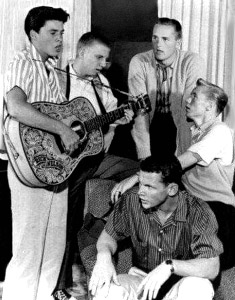
During his off time, Ed Cobb teamed with Mayorga on a side project inspired by the summertime arrival of "Alley-Oop" from comics to musical dominance; recording with studio musicians as The Piltdown Men, they created a percussion-heavy instrumental, "Brontosaurus Stomp," getting airplay in many markets and snagging three weeks on the national charts in September '60. Five more singles by this supposed "stone age" band were released by Capitol over the next two years. The fun didn't stop there: the pair used variations on their first names on two instrumental singles for Reprise. The first by The Link-Eddy Combo came in spring 1961 and despite Cobb-Mayorga composing credits, "Big Mr. C," referencing Ray Charles, was a variation on Ray's '59 hit "What'd I Say." They were also impressed by an audition Ketty Lester gave and helped get her a contract with Era Records; "Love Letters" followed. Ed wasn't the only moonlighting Prep; the group made one final appearance on Ozzie and Harriet's 1960 Christmas episode (singing "Winter Wonderland"), then Bruce Belland stuck around for about a dozen more episodes over the next few seasons.
The group's many college (and occasional high school) concerts gained greater prominence with the late summer album The Four Preps on Campus and its five minute medley containing impressions of hitmaking groups (The Four Freshmen, Fleetwoods, Hollywood Argyles, Platters, Kingston Trio and Dion's "hubcap stealing" Belmonts) while suggesting ways to kill their careers (hang 'em from a tall oak tree like "Tom Dooley"!) so there'll be "More Money for You and Me"...the single hit the top 20 and the LP was a top ten seller. A sequel from early '62, Campus Encore, included "The Big Draft," suggesting this time around they enlist competing singers (male and female) in the armed forces; their targets were The Four Aces, Dick and DeeDee, The Marcels, The Highwaymen and the previously-condemned Platters and Dion (they did, in all fairness, point out that '...we are 1-A too!'). The album series became a seldom-seen live performance trilogy in late '62 with the release of Campus Confidential. But their tours weren't just limited to the world of academia; they were regulars at America's top clubs in New York, Las Vegas, Atlantic City and all points between, in addition to parts of Europe and Asia.
Longtime producer Gilmore stopped working with them in 1963, leaving the reins to pros like Stu Phillips, Dave Axelrod, Al DeLory, Perry Botkin, Jr. and Leon Russell. Returning to an earlier theme, the Four Preps couldn't resist mocking the mania surrounding another famous foursome. As soon as the British Invasion ignited, they issued "A Letter to the Beatles," about being demoted to fifth place in said girlfriend's affections. Rumor has it that Beatles manager Brian Epstein was offended by the song and its bizarre fan club fees and perks ('...a lock of hair from our Saint Bernard...'?). It was the group's final chart single. Ed Cobb's songwriting career took off with "Every Little Bit Hurts," an L.A. recording by Brenda Holloway that connected her with Motown in '64; he also penned her follow-up, "I'll Always Love You." Cobb quit the group in '66 and moved into the world of rock, supplying The Standells with their three biggest hits (including "Dirty Water") while producing and writing music for The Hogs, better known as The Chocolate Watch Band. The Preps replaced him with the former lead singer of The Diamonds, Dave Somerville.
Later singles by the group include a few notables: "Let's Call it a Day Girl" met some measure of success for The Razor's Edge and Bobby Vee. "Love of the Common People" featured Somerville's lead vocal. Their swan song, "Draftdodger Rag," was written by the great musician, songwriter and political activist Phil Ochs. The group broke up within a year of this single's release; Capitol was the only label they ever recorded for. Glen Larson moved into television production and never looked back. Bruce did voice work for animated films including Disney's The Jungle Book, then in 1969 he and Dave formed a duo, Belland and Somerville, and had one single, "When She's Lovin'," on Andy Williams' Barnaby Records. Belland also focused on songwriting, contributing to the catalogs of dozens of 1970s stars. He also produced TV game shows and became a programmer for NBC. His daughters, Tracey and Melissa Belland, followed their father into the music biz (beez?) with the formation of the group Voice of the Beehive; with four male musicians from the U.K. backing their vocals, the band was active from the mid-'80s to mid-'90s, mildly popular in the U.S. with a more impressive run of hits in the U.K.
In the late '80s, The Four Preps reunited with Bruce Belland, Ed Cobb and Dave Somerville joined by Jim Pike of The Lettermen, incorporating Diamonds, Lettermen and Preps hits into their live shows. Cobb and Marv Ingram both passed away in 1999. In later years, as the operatic Three Tenors (Luciano Pavarotti, Placido Domingo and Jose Carreras) soared in popularity, Belland and Somerville teamed with Association singer Jim Yester to form a takeoff act they called The Three Tenors of Rock.
NOTABLE SINGLES:
- Dreamy Eyes - 1956
- Moonstruck in Madrid - 1957
- Falling Star - 1957
- Again 'n' Again 'n' Again - 1957
- Band of Angels - 1957
with Lou Busch and his Orchestra - 26 Miles (Santa Catalina) - 1958
- Big Man - 1958
- Lazy Summer Night /
Summertime Lies - 1958 - Cinderella /
Gidget - 1959 - She Was Five and He Was Ten - 1959
- Big Surprise - 1959
- I Ain't Never - 1959
- Down by the Station - 1960
- Got a Girl - 1960
- Calcutta - 1961
- Dream Boy, Dream - 1961
- More Money for You and Me - 1961
- Once Around the Block - 1961
- The Big Draft - 1962
- Charmaine - 1963
- A Letter to the Beatles - 1964
- The Girl Without a Top - 1964
- The Girl in the Shade of a Striped Umbrella /
Let's Call it a Day Girl - 1966 - Love of the Common People - 1967
- Draftdodger Rag - 1967


